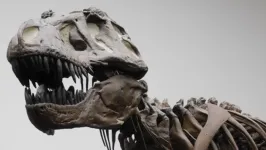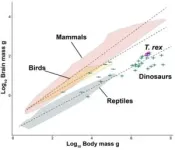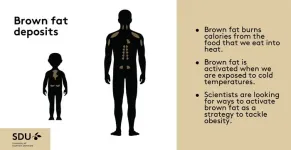(Press-News.org) Dinosaurs were as smart as reptiles but not as intelligent as monkeys, as former research suggests.
An international team of palaeontologists, behavioural scientists and neurologists have re-examined brain size and structure in dinosaurs and concluded they behaved more like crocodiles and lizards.
In a study published last year, it was claimed that dinosaurs like T. rex had an exceptionally high number of neurons and were substantially more intelligent than assumed. It was claimed that these high neuron counts could directly inform on intelligence, metabolism and life history, and that T. rex was rather monkey-like in some of its habits. Cultural transmission of knowledge as well as tool use were cited as examples of cognitive traits that it might have possessed.
However the new study, published today in The Anatomical Record, involving the University of Bristol’s Hady George, Dr Darren Naish (University of Southampton) and led by Dr Kai Caspar (Heinrich Heine University) with Dr Cristian Gutierrez-Ibanez (University of Alberta) and Dr Grant Hurlburt (Royal Ontario Museum) takes a closer look at techniques used to predict both brain size and neuron numbers in dinosaur brains. The team found that previous assumptions about brain size in dinosaurs, and the number of neurons their brains contained, were unreliable.
The research follows decades of analysis in which palaeontologists and biologists have examined dinosaur brain size and anatomy, and used these data to infer behaviour and lifestyle. Information on dinosaur brains comes from mineral infillings of the brain cavity, termed endocasts, as well as the shapes of the cavities themselves.
The team found that their brain size had been overestimated - especially that of the forebrain - and thus neuron counts as well. In addition, they show that neuron count estimates are not a reliable guide to intelligence.
To reliably reconstruct the biology of long-extinct species, the team argues, researchers should look at multiple lines of evidence, including skeletal anatomy, bone histology, the behaviour of living relatives, and trace fossils. “Determining the intelligence of dinosaurs and other extinct animals is best done using many lines of evidence ranging from gross anatomy to fossil footprints instead of relying on neuron number estimates alone,” explained Hady from Bristol’s School of Earth Sciences.
Dr Kai Caspar explained: “We argue that it’s not good practice to predict intelligence in extinct species when neuron counts reconstructed from endocasts are all we have to go on.”
“Neuron counts are not good predictors of cognitive performance, and using them to predict intelligence in long-extinct species can lead to highly misleading interpretations,” added Dr Ornella Bertrand (Institut Català de Paleontologia Miquel Crusafont).
“The possibility that T. rex might have been as intelligent as a baboon is fascinating and terrifying, with the potential to reinvent our view of the past”, concluded Dr Darren Naish. “But our study shows how all the data we have is against this idea. They were more like smart giant crocodiles, and that’s just as fascinating.”
Paper:
‘How smart was T. rex? Testing claims of exceptional cognition in dinosaurs and the application of neuron count estimates in palaeontological research’ by Kai R Caspar, Hady George et al in The Anatomical Record.
END
T. rex not as smart as previously claimed, scientists find
2024-04-29
ELSE PRESS RELEASES FROM THIS DATE:
Breakthrough in brown fat research: Researchers from Denmark and Germany have found brown fat’s “off-switch”
2024-04-29
Brown fat, also known as brown adipose tissue (BAT), is a type of fat in our bodies that's different from the white fat around our belly and thighs that we are more familiar with. Brown fat has a special job—it helps to burn calories from the foods that we eat into heat, which can be helpful, especially when we're exposed to cold temperatures like during winter swimming or cryotherapy. For a long time, scientists thought that only small animals like mice and newborns had brown fat. But new research shows that a certain number of adults maintain their brown fat throughout life. Because brown fat is so good at burning calories, scientists ...
Tech Extension Co. and Tech Extension Taiwan to build next-generation 3D integration manufacturing lines using Tokyo Tech's BBCube Technology
2024-04-29
Tech Extension Co., Ltd. (referred to hereinafter as TEX)[1] and Tech Extension Taiwan Co., Ltd. (referred to hereinafter as TEX-T)[2] have agreed with Innolux Corporation (referred to hereinafter as INNOLUX)[3] to build in a cleanroom of INNOLUX a manufacturing line intended for next-generation 3D integration[4] based on the Bumpless Build Cube (BBCube[5]), which is a technology achieved through the Tokyo Institute of Technology WOW Alliance[6].
TEX will transfer WOW technology[7] and COW technology[8], which are both based on the BBCube technology platform, to this manufacturing line intended for next-generation 3D integration. ...
Atomic nucleus excited with laser: a breakthrough after decades
2024-04-29
Physicists have been hoping for this moment for a long time: for many years, scientists all around the world have been searching for a very specific state of thorium atomic nuclei that promises revolutionary technological applications. It could be used, for example, to build an nuclear clock that could measure time more precisely than the best atomic clocks available today. It could also be used to answer completely new fundamental questions in physics - for example, the question of whether the constants of nature are actually constant or whether they change in space ...
Losing keys and everyday items ‘not always sign of poor memory’
2024-04-29
The mysteries of how memory works are explained in a new book that suggests anyone can boost their powers of recall – and that losing your keys is normal.
Dr Megan Sumeracki and Dr Althea Need Kaminske say storing and retrieving information is far more complex than people think. Extremes of memory such as photographic or savant are also very rare despite their regular portrayal in films.
Their new book The Psychology of Memory outlines simple recollection-boosting techniques to improve learning – or to help remember names and numbers.
Forgetting is normal
The authors highlight how a degree ...
People with opioid use disorder less likely to receive palliative care at end of life
2024-04-29
Compared with people without opioid use disorder, those with opioid use disorder were less likely to receive palliative care in clinics and in their homes, and were dying at younger ages of causes other than opioid use, according to new research published in CMAJ (Canadian Medical Association Journal) https://www.cmaj.ca/lookup/doi/10.1503/cmaj.231419.
“The majority of conversations about the opioid crisis focus on the high number of opioid toxicity deaths. The unfortunate reality is that people with opioid use disorder ...
New Durham University study reveals mystery of decaying exoplanet orbits
2024-04-29
-With images-
A new study led by researchers at Durham University has uncovered a novel mechanism that could solve a long-standing mystery about decaying planetary orbits around stars like our Sun.
The study, published in The Astrophysical Journal Letters, proposes that stellar magnetic fields play a crucial role in dissipating the gravitational tides responsible for the orbital decay of ‘hot Jupiter’ exoplanets.
Hot Jupiters are massive, gaseous planets similar to Jupiter that orbit extraordinarily close to their parent stars, taking only a few days to complete ...
The threat of polio paralysis may have disappeared, but enterovirus paralysis is just as dangerous and surveillance and testing systems are desperately needed
2024-04-29
Consistently high vaccination rates and global health surveillance programmes have helped eliminate poliomyelitis (polio) in almost all countries of the world, except Afghanistan and Pakistan. Yet non-polio enteroviruses can also lead to the same devastating symptoms of ‘acute flaccid paralysis’ (AFP), but the world is lacking formal surveillance systems to trace and control these viruses with paralytic potential.
In a presentation at this year’s ESCMID Global Congress (formerly ECCMID) (Barcelona 27-30 April), Prof Thea Kølsen Fischer, Nordsjællands Hospital & University of Copenhagen, Denmark will highlight the continuous dangers that ...
Study shows ChatGPT failed when challenging ESCMID guideline for treating brain abscesses
2024-04-29
With artificial intelligence (AI) poised to become a fundamental part of clinical research and decision making, many still question the accuracy of ChatGPT, a sophisticated AI language model, to support complex diagnostic and treatment processes.
Now a new study, being presented at this year’s ESCMID Global Congress (formerly ECCMID) in Barcelona, Spain (27-30 April), which pitted ChatGPT against the ESCMID guideline for the management of brain abscesses, found that while ChatGPT seems able to give recommendations on key questions about diagnosis and treatment in most cases, some of the AI model’s ...
Study finds resistance to critically important antibiotics in uncooked meat sold for human and animal consumption
2024-04-29
**Note: the release below is from the ESCMID Global Congress (formerly ECCMID, Barcelona, Spain, 27-30 April). Please credit the congress if you use this story**
New research presented at the ESCMID Global Congress (formerly ECCMID) in Barcelona, Spain (27-30 April) has found substantial levels of resistance to critically important antibiotics in meat sold for human and animal consumption. The study is by Dr Jordan Sealey, Professor Matthew Avison and colleagues from the University of Bristol, UK.
Meat sold for consumption by humans and companion animals in the UK is regulated by the UK Government Food Standards Agency (FSA) to ensure it falls within bacterial limits deemed ...
Global cervical cancer vaccine roll-out shows it to be very effective in reducing cervical cancer and other HPV-related disease, but huge variations between countries in coverage
2024-04-28
With the creation of safe and efficacious vaccines to target human papillomavirus in the first decade of this century, WHO has an ambitious target to lower cervical cancer incidence (mostly caused by HPV) and mortality by 30% by 2030, meaning each country has a target of vaccinating 90% of girls by age 15, 70% of women receiving a high precision screening test at least at age 35 and 45 years of age, and 90% of all women requiring treatment at any age to receive it. The targets are aspirational and as yet, it appears no country has been ...



